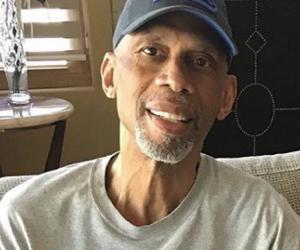178 Inspiring Quotes By Kareem Abdul-Jabbar
Kareem Abdul-Jabbar is a prominent American former professional basketball player. He played twenty seasons for the ‘Los Angeles Lakers,’ and ‘Milwaukee Bucks,’ in the ‘National Basketball Association.’ During his career as a centre, he has been a 15-time ‘All-NBA selection,’ six-time ‘NBA Most Valuable Player,’ 11-time ‘NBA-Defensive Team,’ and 19-time ‘NBA All-Star.’ He has also been a best-selling author and actor besides being a basketball coach. He was awarded the ‘Presidential Medal of Freedom’ by ‘President Barack Obama’ in 2016. Here is a list of quotes by Kareem Abdul-Jabbar on sports, basketball, sacrifice, success, accomplishments, winning, leader, learn, soul, achieve, history, people, belief, home, magic, nature, effort, etc.
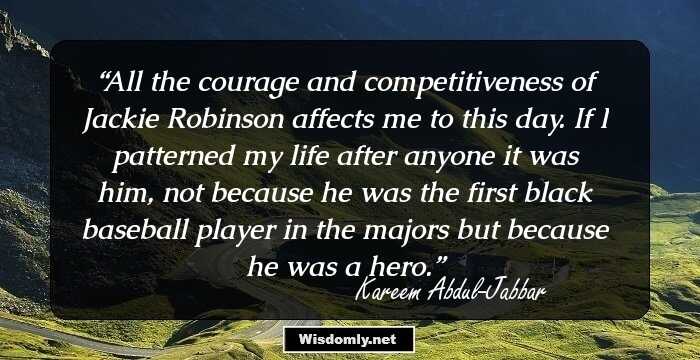
All the courage and competitiveness of Jackie Robinson affects me to this day. If I patterned my life after anyone it was him, not because he was the first black baseball player in the majors but because he was a hero.
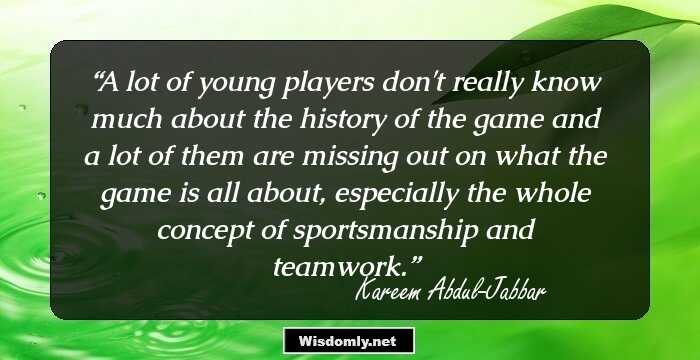
A lot of young players don't really know much about the history of the game and a lot of them are missing out on what the game is all about, especially the whole concept of sportsmanship and teamwork.
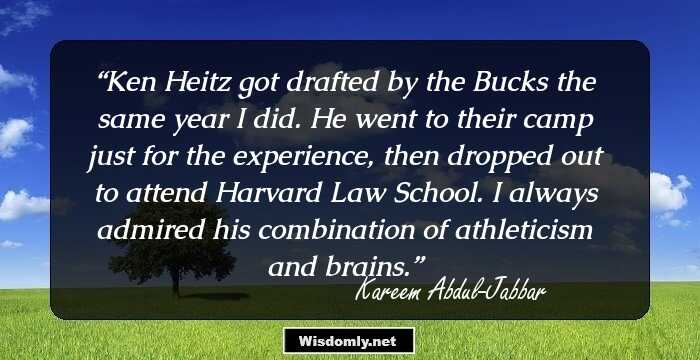
Ken Heitz got drafted by the Bucks the same year I did. He went to their camp just for the experience, then dropped out to attend Harvard Law School. I always admired his combination of athleticism and brains.
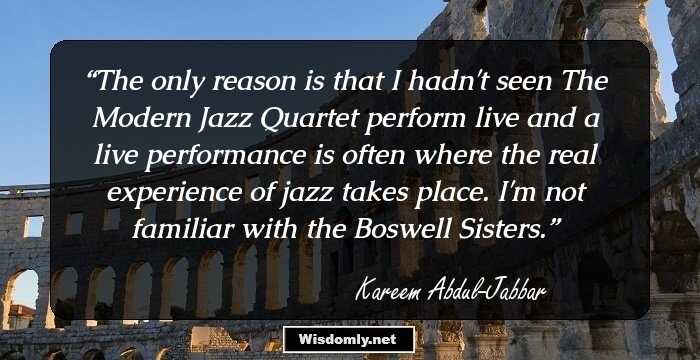
The only reason is that I hadn't seen The Modern Jazz Quartet perform live and a live performance is often where the real experience of jazz takes place. I'm not familiar with the Boswell Sisters.
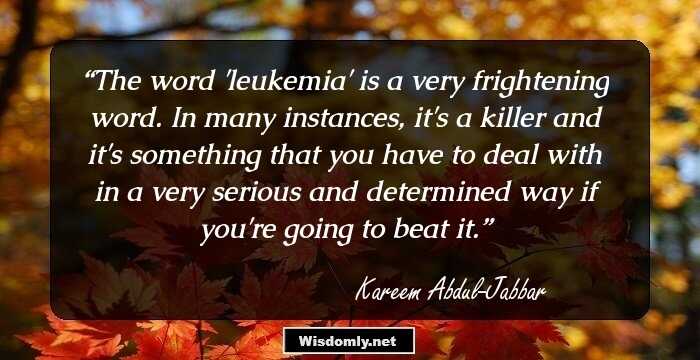
The word 'leukemia' is a very frightening word. In many instances, it's a killer and it's something that you have to deal with in a very serious and determined way if you're going to beat it.
![I read that Hollywood wanted to film Fences years ago with a white director, but [August] Wilson refused. He thought that the director needed to have lived the culture of black Americans.](https://www.wisdomly.net/images/quotes/kareem-abdul-jabbar-138030.jpg)
I read that Hollywood wanted to film Fences years ago with a white director, but [August] Wilson refused. He thought that the director needed to have lived the culture of black Americans.
![Common decency demands that [NCAA athletes] should be paid, but the only way it will happen is the same way workers got paid throughout American history, through a strong union.](https://www.wisdomly.net/images/quotes/kareem-abdul-jabbar-138029.jpg)
Common decency demands that [NCAA athletes] should be paid, but the only way it will happen is the same way workers got paid throughout American history, through a strong union.
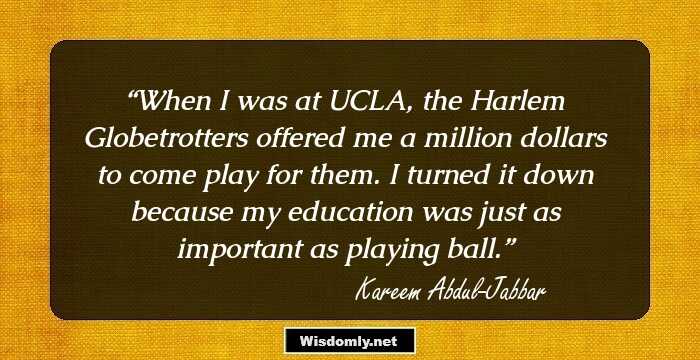
When I was at UCLA, the Harlem Globetrotters offered me a million dollars to come play for them. I turned it down because my education was just as important as playing ball.
![When I traveled through Greece in the '90s, everything [Albert Hoxie] taught me came flooding back and I was able to appreciate the art and culture much more because of him.](https://www.wisdomly.net/images/quotes/kareem-abdul-jabbar-138027.jpg)
When I traveled through Greece in the '90s, everything [Albert Hoxie] taught me came flooding back and I was able to appreciate the art and culture much more because of him.
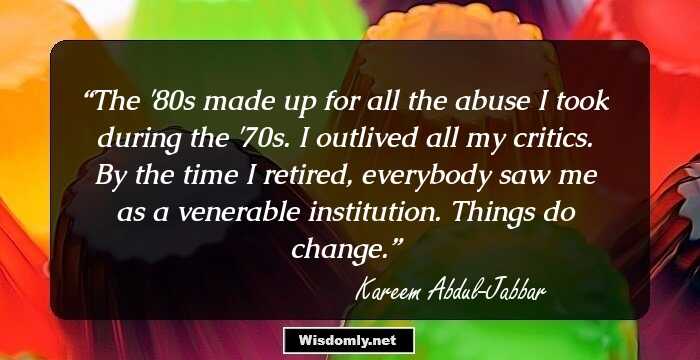
The '80s made up for all the abuse I took during the '70s. I outlived all my critics. By the time I retired, everybody saw me as a venerable institution. Things do change.
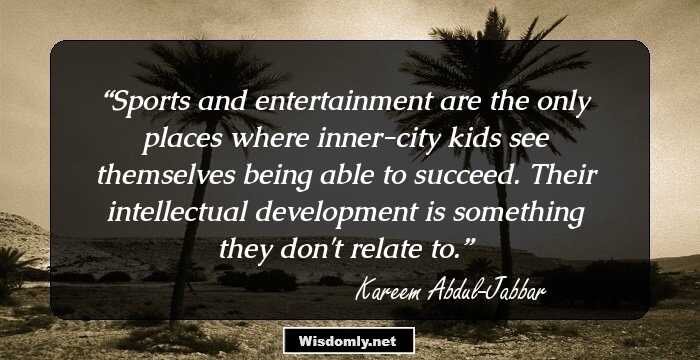
Sports and entertainment are the only places where inner-city kids see themselves being able to succeed. Their intellectual development is something they don't relate to.
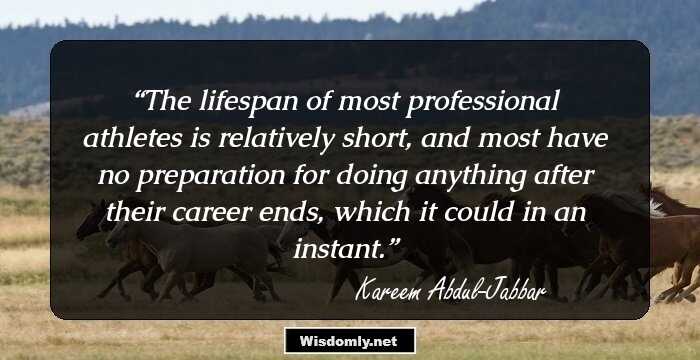
The lifespan of most professional athletes is relatively short, and most have no preparation for doing anything after their career ends, which it could in an instant.
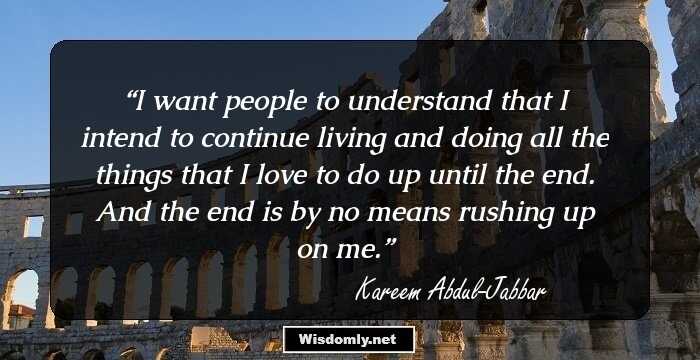
I want people to understand that I intend to continue living and doing all the things that I love to do up until the end. And the end is by no means rushing up on me.
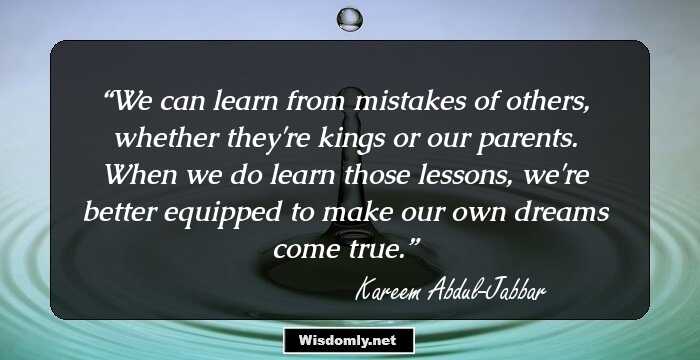
We can learn from mistakes of others, whether they're kings or our parents. When we do learn those lessons, we're better equipped to make our own dreams come true.
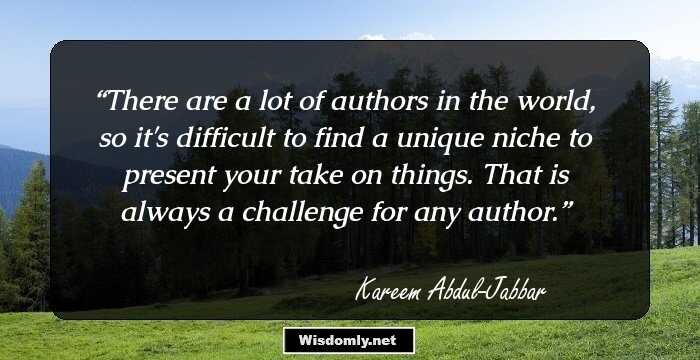
There are a lot of authors in the world, so it's difficult to find a unique niche to present your take on things. That is always a challenge for any author.
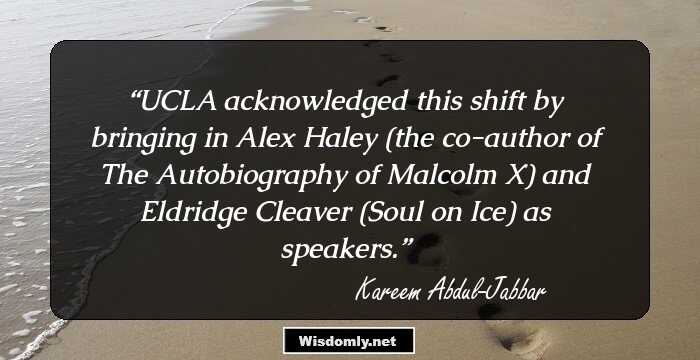
UCLA acknowledged this shift by bringing in Alex Haley (the co-author of The Autobiography of Malcolm X) and Eldridge Cleaver (Soul on Ice) as speakers.
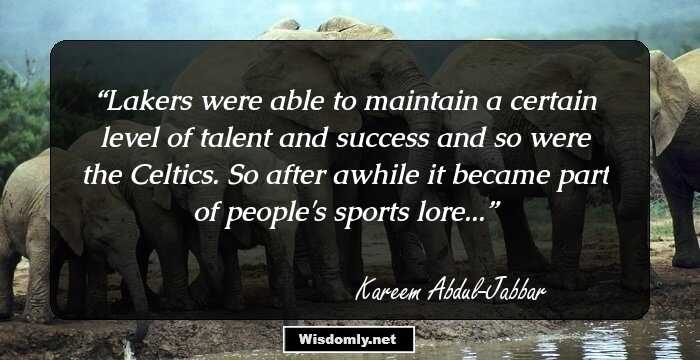
Lakers were able to maintain a certain level of talent and success and so were the Celtics. So after awhile it became part of people's sports lore...
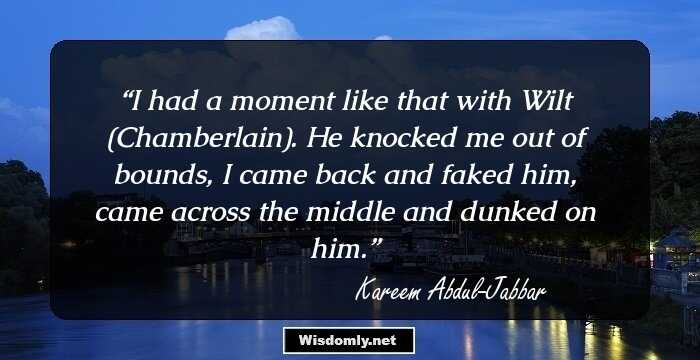
I had a moment like that with Wilt (Chamberlain). He knocked me out of bounds, I came back and faked him, came across the middle and dunked on him.
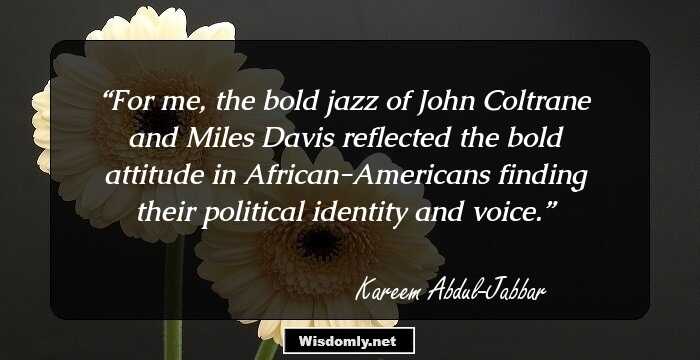
For me, the bold jazz of John Coltrane and Miles Davis reflected the bold attitude in African-Americans finding their political identity and voice.
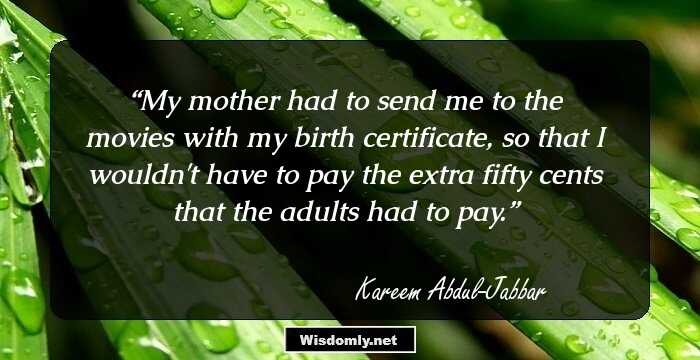
My mother had to send me to the movies with my birth certificate, so that I wouldn't have to pay the extra fifty cents that the adults had to pay.
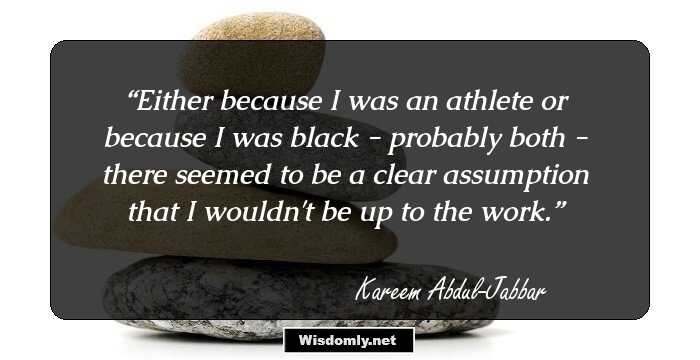
Either because I was an athlete or because I was black - probably both - there seemed to be a clear assumption that I wouldn't be up to the work.
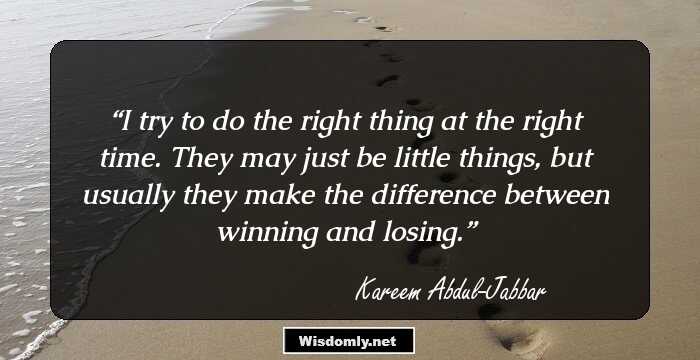
I try to do the right thing at the right time. They may just be little things, but usually they make the difference between winning and losing.
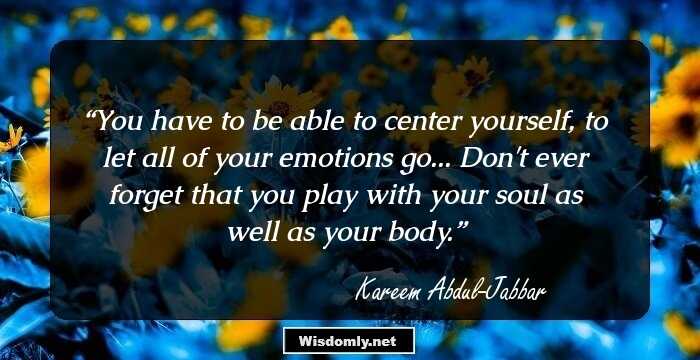
You have to be able to center yourself, to let all of your emotions go... Don't ever forget that you play with your soul as well as your body.
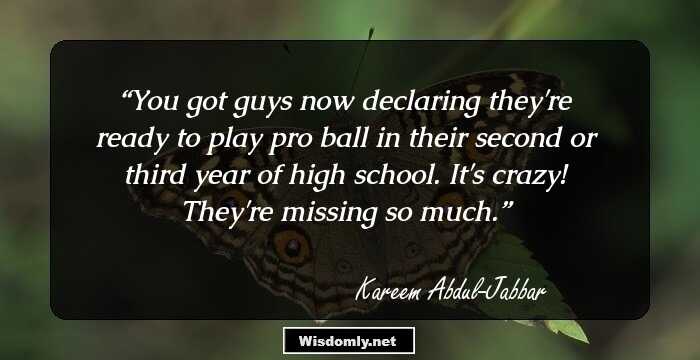
You got guys now declaring they're ready to play pro ball in their second or third year of high school. It's crazy! They're missing so much.
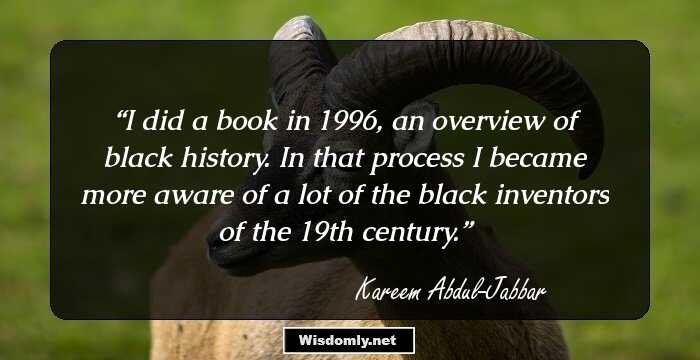
I did a book in 1996, an overview of black history. In that process I became more aware of a lot of the black inventors of the 19th century.
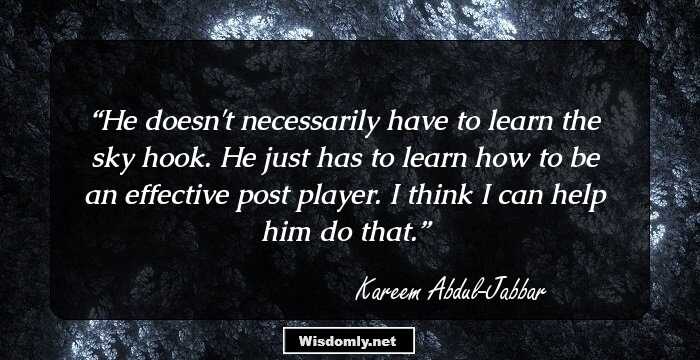
He doesn't necessarily have to learn the sky hook. He just has to learn how to be an effective post player. I think I can help him do that.
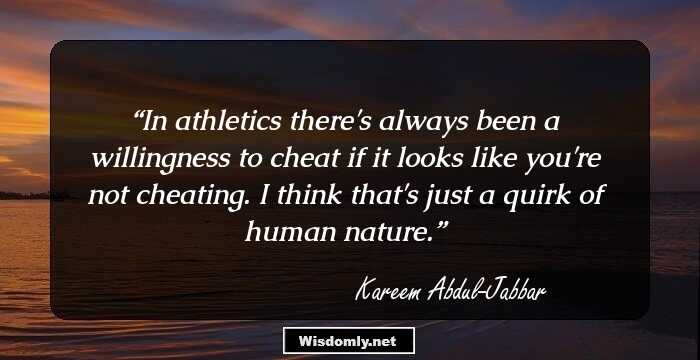
In athletics there's always been a willingness to cheat if it looks like you're not cheating. I think that's just a quirk of human nature.
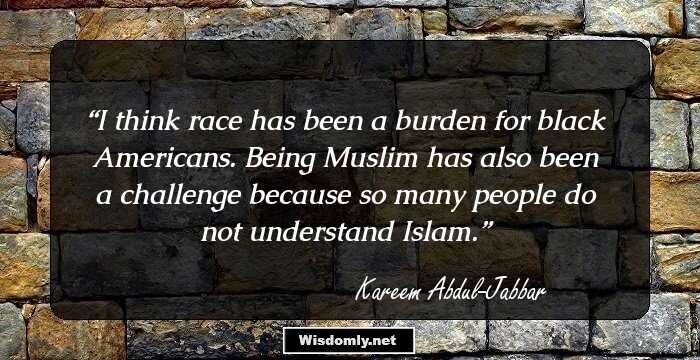
I think race has been a burden for black Americans. Being Muslim has also been a challenge because so many people do not understand Islam.
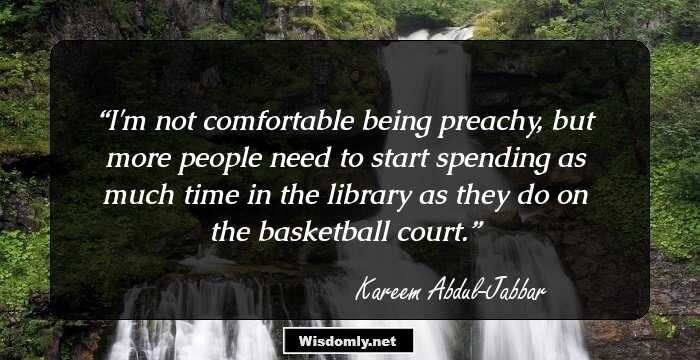
I'm not comfortable being preachy, but more people need to start spending as much time in the library as they do on the basketball court.
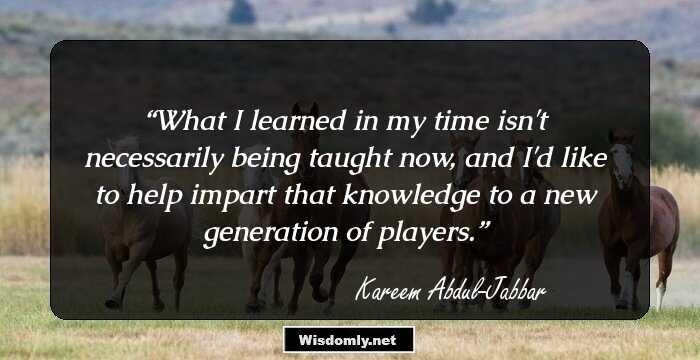
What I learned in my time isn't necessarily being taught now, and I'd like to help impart that knowledge to a new generation of players.

